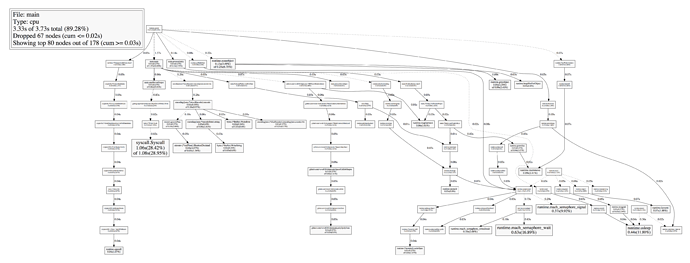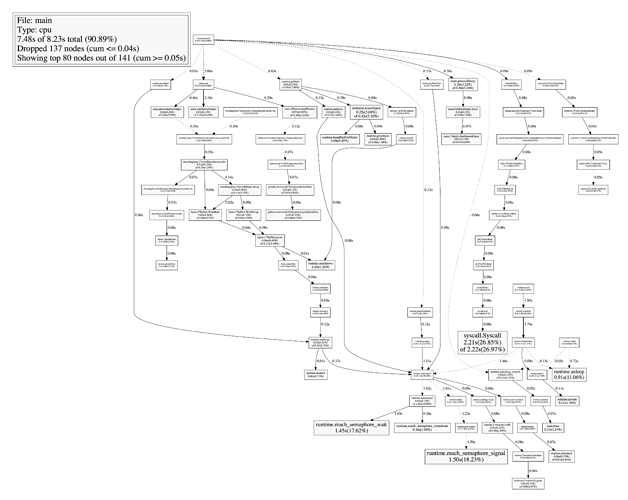I’ll make a little graph of the estimations of CPU usage. Sorry about the formatting, I couldn’t get an actual table to look nice:
(num of people, cpu %)
(0, 2%)
(1, 3.2%)
(2, 4.5%)
(3, 5.5%)
(4, 6.5%)
(5, 7.8%)
(6, 8.6%)
(6 with 1 Enemy, 30%)
So there is definitely an issue with enemies. When I was collecting data for the profiler I did make sure I spawned an enemy and it didn’t seem like any other function was being expensive.
I tried printing the garbage collection and here’s what I got…I’m not too sure what it means though:(
gc 1 @0.007s 4%: 0.085+0.67+0.18 ms clock, 0.17+1.0/1.1/0.48+0.36 ms cpu, 4->4->1 MB, 5 MB goal, 8 P gc 2 @0.010s 6%: 0.023+1.0+0.16 ms clock, 0.070+1.1/1.5/1.3+0.48 ms cpu, 4->4->1 MB, 5 MB goal, 8 P gc 3 @0.013s 8%: 0.040+0.91+0.16 ms clock, 0.12+1.2/1.6/1.6+0.50 ms cpu, 4->4->1 MB, 5 MB goal, 8 P gc 4 @0.016s 10%: 0.054+1.6+0.22 ms clock, 0.21+1.8/2.9/3.7+0.90 ms cpu, 4->4->2 MB, 5 MB goal, 8 P gc 5 @0.019s 11%: 0.022+0.98+0.15 ms clock, 0.090+1.4/1.8/2.3+0.62 ms cpu, 4->4->2 MB, 5 MB goal, 8 P gc 6 @0.021s 12%: 0.020+0.98+0.13 ms clock, 0.080+1.2/1.9/3.0+0.55 ms cpu, 5->5->3 MB, 6 MB goal, 8 P gc 7 @0.026s 12%: 0.050+1.3+0.16 ms clock, 0.20+1.7/2.4/2.8+0.65 ms cpu, 6->6->3 MB, 7 MB goal, 8 P gc 8 @0.029s 13%: 0.14+1.6+0.17 ms clock, 0.59+1.6/2.5/3.1+0.70 ms cpu, 7->7->3 MB, 8 MB goal, 8 P gc 9 @0.033s 13%: 0.020+1.2+0.20 ms clock, 0.083+1.4/2.3/3.3+0.82 ms cpu, 6->7->5 MB, 7 MB goal, 8 P gc 10 @0.036s 14%: 0.24+1.1+0.085 ms clock, 0.98+1.2/2.0/3.3+0.34 ms cpu, 9->9->6 MB, 10 MB goal, 8 P gc 11 @0.040s 14%: 0.034+1.3+0.091 ms clock, 0.13+1.4/2.2/2.9+0.36 ms cpu, 11->11->6 MB, 12 MB goal, 8 P gc 12 @0.042s 15%: 0.13+1.4+0.27 ms clock, 0.54+1.4/2.7/3.0+1.1 ms cpu, 13->13->8 MB, 14 MB goal, 8 P gc 13 @0.045s 15%: 0.72+1.2+0.16 ms clock, 2.8+1.5/2.2/3.2+0.65 ms cpu, 16->17->12 MB, 17 MB goal, 8 P gc 14 @0.048s 16%: 0.13+2.0+0.12 ms clock, 0.55+2.0/3.5/3.7+0.50 ms cpu, 24->25->17 MB, 25 MB goal, 8 P gc 15 @0.053s 16%: 0.28+1.3+0.30 ms clock, 1.1+1.8/2.2/2.2+1.2 ms cpu, 31->32->22 MB, 34 MB goal, 8 P gc 16 @0.058s 16%: 0.19+1.6+0.14 ms clock, 0.78+1.8/2.2/2.5+0.59 ms cpu, 44->44->31 MB, 45 MB goal, 8 P gc 17 @0.070s 14%: 0.033+0.95+0.24 ms clock, 0.13+2.9/1.8/0+0.97 ms cpu, 57->57->31 MB, 62 MB goal, 8 P gc 18 @0.096s 12%: 0.096+2.3+0.10 ms clock, 0.77+6.8/3.8/0.048+0.86 ms cpu, 60->61->31 MB, 62 MB goal, 8 P
As for the client receiving data, it will just wait for data to come in from the server and update it’s game state according to the data it receives.
var sock = new WebSocket(ip); //73.158.248.23 sock.onmessage = function(m) {Server.receiveData(m, game)}
For sending data, it is constantly sending data every 15 milliseconds.
window.setInterval(function(){ game.sendData(); }, 15);
Honestly, the packets that the server sends are sometimes pretty large (I think). I’ll put an example packet below:
{"Objects":[{"Id":"887ab535-4d16-4b7a-ba5f-85089e4fbbeb","Username":"","Parent":"","Child":"","Height":0,"Type":"Npc","Tag":"EyeEnemy","Health":100,"HealthCap":100,"Power":100,"MaxPower":0,"X":743.8494262695312,"Y":748.7734375,"Rot":0.19684016704559326,"Items":null},{"Id":"ffade326-dff9-4fd5-ae26-0477e75e3e05","Username":"","Parent":"","Child":"","Height":0,"Type":"Npc","Tag":"EyeEnemy","Health":100,"HealthCap":100,"Power":100,"MaxPower":0,"X":743.4473876953125,"Y":750.5331420898438,"Rot":-0.08118445426225662,"Items":null},{"Id":"33d44406-8709-4e89-a6e1-482a3da4a320","Username":"","Parent":"","Child":"","Height":0,"Type":"Npc","Tag":"EyeEnemy","Health":100,"HealthCap":100,"Power":100,"MaxPower":0,"X":760.0582885742188,"Y":763.01904296875,"Rot":-2.2285945415496826,"Items":null},{"Id":"3f97337e-5b43-40c1-a9d8-119a842ea002","Username":"","Parent":"","Child":"","Height":0,"Type":"Npc","Tag":"EyeEnemy","Health":100,"HealthCap":100,"Power":100,"MaxPower":0,"X":756.9351196289062,"Y":768.0557250976562,"Rot":-1.9375170469284058,"Items":null},{"Id":"ae562dff-f3bb-4a54-8aa5-49fb5e466d33","Username":"","Parent":"","Child":"","Height":0,"Type":"Npc","Tag":"EyeEnemy","Health":100,"HealthCap":100,"Power":100,"MaxPower":0,"X":755.141357421875,"Y":778.2151489257812,"Rot":-1.7510385513305664,"Items":null},{"Id":"1ecc1629-7369-4406-89f2-0aca9ad3886a","Username":"","Parent":"","Child":"","Height":0,"Type":"Npc","Tag":"EyeBoss","Health":500,"HealthCap":500,"Power":100,"MaxPower":0,"X":750,"Y":750,"Rot":0,"Items":null},{"Id":"f178503a-05b7-4e38-98da-9a0e5ad777aa","Username":"","Parent":"","Child":"","Height":0,"Type":"Npc","Tag":"EyeEnemy","Health":100,"HealthCap":100,"Power":100,"MaxPower":0,"X":767.244140625,"Y":775.5899047851562,"Rot":-2.1637659072875977,"Items":null},{"Id":"916b895d-0b42-4fa8-ad05-cc4d98370c2a","Username":"","Parent":"","Child":"","Height":0,"Type":"Npc","Tag":"DickEnemy","Health":500,"HealthCap":500,"Power":100,"MaxPower":0,"X":-700,"Y":-700,"Rot":0,"Items":null},{"Id":"d1220ac7-ea44-4d2b-9954-003574af0642","Username":"","Parent":"","Child":"","Height":0,"Type":"GameObject","Tag":"Laser MKII","Health":100,"HealthCap":100,"Power":100,"MaxPower":0,"X":-50,"Y":-50,"Rot":0,"Items":null}],"Cp":{"Id":"7629ab7d-8cab-4c96-ad4a-5d1116f8fc46","Username":"Johnsy","Parent":"","Child":"","Height":0,"Score":0,"Health":100,"HealthCap":100,"Power":200,"MaxPower":200,"X":0,"Y":0,"Rot":-0.05031720548868179,"MouseAngle":0,"Items":["","","","","","",""],"Targets":[{"Distance":70,"Angle":-2.356194490192345}]},"Leaderboard":[{"Username":"Johnsy","Score":0},{"Username":"","Score":0},{"Username":"","Score":0},{"Username":"","Score":0},{"Username":"","Score":0}]}
It’s around 2500 bytes. It seems large to me but maybe I’m just underestimating what I’m able to send over sockets?



 Do you think it would make that much of a difference in the server’s performance to switch to TCP/UDP? Because as it is the messages are being sent fast enough and there isn’t much lag it’s just that the server is being very expensive.
Do you think it would make that much of a difference in the server’s performance to switch to TCP/UDP? Because as it is the messages are being sent fast enough and there isn’t much lag it’s just that the server is being very expensive.